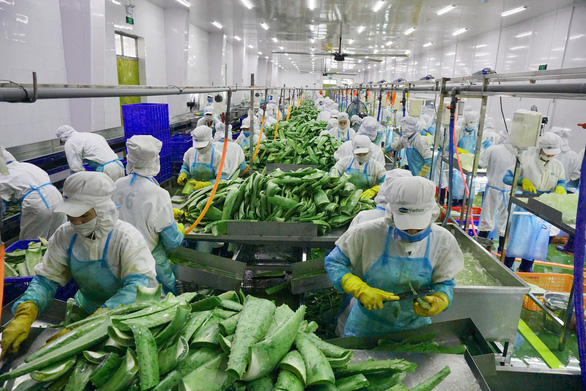The State Bank of Vietnam (SBV) has revised up the credit growth target for the domestic banking system by 1.5-2 percentage points from its previous target of 14 percent, allowing it to pump an additional VND200 trillion (US$8.4 billion) into the local economy.
According to a report by SSI Securities Corporation, the SBV’s expansion of the credit growth cap to 15.5-16 percent raises the country’s total credit for this month to VND400 billion ($16.7 million).
According to experts, the revision will help businesses, and the economy as a whole, amidst a soaring thirst for capital.
The central bank has yet to announce exactly which banks will be eligible to increase their credit limits.
As of the end of October, Vietnam’s credit growth sat at 11.5 percent, allowing for just 2.5 percent credit growth for the final two months of the year – a modest amount given the massive demand.
In response to the announcement, the director of a company in Binh Tan District, Ho Chi Minh City told Tuoi Tre (Youth) newspaper that the revision is welcomed given that many banks had stopped issuing loans.
Currently, many banks are asking borrowers to pay off existing loans before they can issue new disbursements, however whether there will actually be a lending room remains questionable.
Dinh The Hien, an economic expert, told Tuoi Tre that the credit growth cap expansion will increase the working capital of enterprises, rather than serve investments or real estate projects.
“It would have been better to raise the credit growth cap in November, but better late than never,” Hien said, adding that the policy will help enterprises build momentum for economic growth in the coming year.
“If the SBV waits until 2023 to expand credit, it will be hard to restart a system that has been suspended for a long time.”
Beneficiaries of the policy
The general director of a commercial bank in Ho Chi Minh City told Tuoi Tre that once the revision comes into effect, their bank will prioritize enterprises that are currently waiting for the credit growth cap expansion.
The SBV clarified that the capital issued in light of the revision must be prioritized for production and business activities; priority sectors such as agriculture, rural development and export; small and medium enterprises; and supporting industries.
“Despite the extra lending room, Vietnam’s credit growth must follow the safety of lending activities and liquidity," the general director said.
“Banks must ensure that deposit rate hikes are under control as the surge in savings rates will send lending rates soaring, posing a high risk for future bad debts.
“The central bank also emphasized that the increase in credit quotas for banks should go hand in hand with risk management in order to ensure liquidity, safety, and payments, especially during the Lunar New Year, or Tet, holiday."
SSI assessed that commercial banks that have cut their lending rates will have an advantage in securing higher credit quotas.
“The pressure on banks to balance capital is huge, while liquidity in the banking system in the medium term has yet to improve as deposit growth is much lower than credit growth,” an expert from SSI said.
Easing difficulties
According to financial expert Trinh Doan Tuan Linh, enterprises in Vietnam had faced difficulties accessing capital for the past several years, but only in the past 12 months has the situation become more serious.
That situation could become much more dire as the Vietnamese new year approaches.
“Enterprises with business models that revolve around Tet need capital to import goods. They also need money to settle debts, as well as pay salaries and Tet bonuses to their employees,” Linh said.
Supervising credit, preventing profiteering
At a cabinet meeting on Tuesday, Prime Minister Pham Minh Chinh tasked regulators with keeping a close watch on the stock, corporate bond, and real estate markets, as well as the capital demand of enterprises and residents.
PM Chinh also charged Deputy Prime Minister Le Minh Khai with directing the creation of a decree amending current regulations on stock, bond, and property markets; creating solutions to effectively regulate monetary policies; striking a balance between exchange rates and interest rates; and controlling inflation while boosting economic growth.
As for the credit growth cap increase, the prime minister stressed the importance of transparency and the prioritization of using capital for investment, export, and consumption.
He also tasked relevant agencies with increasing their credit monitoring practices and preventing irregularities and profiteering.
According to PM Chinh, policies should also be created for residents to increase access to social housing.
The Ministry of Finance was asked to continue formulating proposals that lower taxes and extend tax and fee payment deadlines for residents and enterprises.
It was also requested that competitive pricing be adopted for aviation services, medicines, medical equipment, and fuel.
Priority to be given to eligible banks
Credit growth cap expansion is needed, but the policy should be limited to beneficiaries with proven track records, as well as those in manufacturing, export, and agriculture sectors that have already secured orders they need to fulfill, according to Tran Viet Anh, general director of Nam Thai Son Export Import JSC.
The requirements should be eased for enterprises with good liquidity and stable cash inflows over the last three months, firms manufacturing goods for Tet and having orders, and those whose workers are having jobs to do.
The policy should not be applied to enterprises that have not secured orders or that have no cash flow or unstable cash flow.
In addition, credit quotas should be expanded for banks with good interest rate policies.
Like us on Facebook or follow us on Twitter to get the latest news about Vietnam!


















































